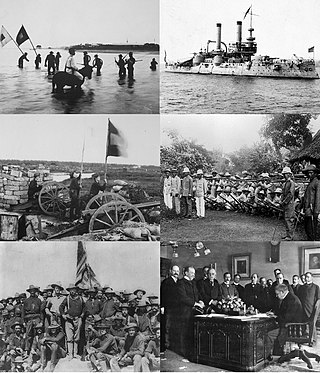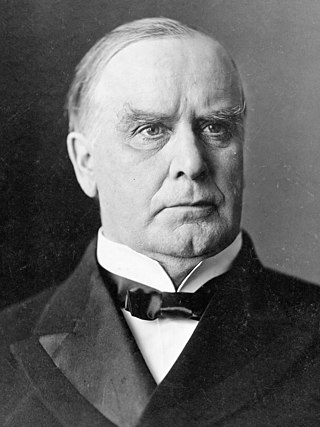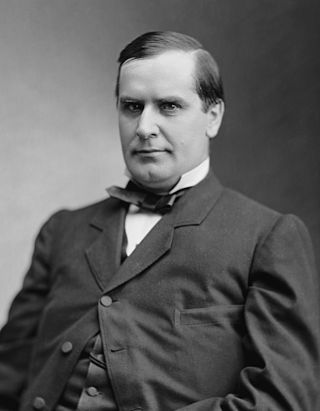
The Spanish–American War was a period of armed conflict between Spain and the United States. Hostilities began in the aftermath of the internal explosion of USS Maine in Havana Harbor in Cuba, leading to United States intervention in the Cuban War of Independence. The war led to the United States emerging predominant in the Caribbean region, and resulted in U.S. acquisition of Spain's Pacific possessions. It led to United States involvement in the Philippine Revolution and later to the Philippine–American War.

William McKinley was the 25th president of the United States, serving from 1897 until his assassination in 1901. As a politician he led a realignment that made his Republican Party largely dominant in the industrial states and nationwide until the 1930s. He presided over victory in the Spanish–American War of 1898; gained control of Hawaii, Puerto Rico, the Philippines and Cuba; restored prosperity after a deep depression; rejected the inflationary monetary policy of free silver, keeping the nation on the gold standard; and raised protective tariffs to boost American industry and keep wages high.

The 1900 United States presidential election was the 29th quadrennial presidential election, held on Tuesday, November 6, 1900. In a re-match of the 1896 race, incumbent Republican President William McKinley defeated his Democratic challenger, William Jennings Bryan. McKinley's victory made him the first president to win a consecutive re-election since Ulysses S. Grant had accomplished the same feat in 1872. Until 1956, this would be the last time in which an incumbent Republican president would win re-election after serving a full term in office. This election saw the fifth rematch in presidential history, something that would also not occur again until 1956. This was also the first rematch to produce the same winner both times.

William Jennings Bryan was an American lawyer, orator and politician. Beginning in 1896, he emerged as a dominant force in the Democratic Party, running three times as the party's nominee for President of the United States in the 1896, 1900, and the 1908 elections. He served in the House of Representatives from 1891 to 1895 and as the Secretary of State under Woodrow Wilson. Because of his faith in the wisdom of the common people, Bryan was often called "The Great Commoner", and because of his rhetorical power and early fame as the youngest presidential candidate, "The Boy Orator".

The Tariff Act of 1890, commonly called the McKinley Tariff, was an act of the United States Congress, framed by then Representative William McKinley, that became law on October 1, 1890. The tariff raised the average duty on imports to almost fifty percent, an increase designed to protect domestic industries and workers from foreign competition, as promised in the Republican platform. It represented protectionism, a tactic supported by Republicans and denounced by Democrats. It was a major topics for fierce debate in the 1890 Congressional elections, which gave a Democratic landslide.

The Dingley Act of 1897, introduced by U.S. Representative Nelson Dingley Jr., of Maine, raised tariffs in United States to counteract the Wilson–Gorman Tariff Act of 1894, which had lowered rates. The bill came into effect under William McKinley the first year that he was in office. The McKinley administration wanted to bring back the protectionism slowly that was proposed by the Tariff of 1890.

The Treaty of Peace between the United States of America and the Kingdom of Spain, commonly known as the Treaty of Paris of 1898, was a treaty signed by Spain and the United States on December 10, 1898, that ended the Spanish–American War. Under it, Spain relinquished all claim of sovereignty over and title to territories described there as the island of Porto Rico and other islands now under Spanish sovereignty in the West Indies, and the island of Guam in the Marianas or Ladrones, the archipelago known as the Philippine Islands, and comprehending the islands lying within the following line:, to the United States. The cession of the Philippines involved a compensation of $20 million from the United States to Spain.

The Teller Amendment was an amendment to a joint resolution of the United States Congress, enacted on April 20, 1898, in reply to President William McKinley's War Message. It placed a condition on the United States military's presence in Cuba. According to the clause, the U.S. could not annex Cuba but only leave "control of the island to its people." In short, the U.S. would help Cuba gain independence and then withdraw all its troops from the country.

William Lyne Wilson was an American politician and lawyer from West Virginia. A Bourbon Democrat, Wilson was elected to the United States Congress in 1882 and served six terms of office, ending in 1895.

William Pierce Frye was an American politician from Maine. A member of the Republican Party, Frye spent most of his political career as a legislator, serving in the Maine House of Representatives and then U.S. House of Representatives, before being elected to the U.S. Senate, where he served for 30 years before dying in office. Frye was a member of the Frye political family, and was the grandfather of Wallace H. White Jr., and the son of John March Frye. He was also a prominent member of the Peucinian Society tradition.

The National Democratic Party, also known as Gold Democrats, was a short-lived political party of Bourbon Democrats who opposed the regular party nominee William Jennings Bryan in the 1896 presidential election. The party was then a "liberal" party in the context of the times, which is more of a fiscal-conservative or classical-liberal in the political context of the United States today.

The timeline of events of the Spanish–American War covers major events leading up to, during, and concluding the Spanish–American War, a ten-week conflict in 1898 between Spain and the United States of America.

The Fourth Party System was the political party system in the United States from about 1896 to 1932 that was dominated by the Republican Party, except the 1912 split in which Democrats captured the White House and held it for eight years.

The presidency of William McKinley began on March 4, 1897, when William McKinley was inaugurated and ended September 14, 1901, upon his assassination. A longtime Republican, McKinley is best known for conducting the successful Spanish–American War (1898), freeing Cuba from Spain; taking ownership of the Republic of Hawaii; and purchasing the Philippines, Guam and Puerto Rico. It includes the 1897 Dingley Tariff which raised rates to protect manufacturers and factory workers from foreign competition, and the Gold Standard Act of 1900 that rejected free silver inflationary proposals. Rapid economic growth and a decline in labor conflict marked the presidency and he was easily reelected in a landslide.
Protectionism in the United States is protectionist economic policy that erects tariffs and other barriers on imported goods. In the US this policy was most prevalent in the 19th century. At that time it was mainly used to protect Northern industries and was opposed by Southern states that wanted free trade to expand cotton and other agricultural exports. Protectionist measures included tariffs and quotas on imported goods, along with subsidies and other means, to restrain the free movement of imported goods, thus encouraging local industry.

The 1900 United States elections elected the 57th United States Congress. The election was held during the Fourth Party System. Republicans retained control of the Presidency and both houses of Congress, while third parties suffered defeats.

The 1900 United States presidential election in North Carolina took place on November 6, 1900. All contemporary 45 states were part of the 1900 United States presidential election. North Carolina voters chose 11 electors to the Electoral College, which selected the president and vice president.

The history of U.S. foreign policy from 1897 to 1913 concerns the foreign policy of the United States during the Presidency of William McKinley, Presidency of Theodore Roosevelt, and Presidency of William Howard Taft. This period followed History of U.S. foreign policy, 1861–1897 and began with the inauguration of McKinley in 1897. It ends with Woodrow Wilson in 1913, and the 1914 outbreak of World War I, which marked the start of new era in U.S. foreign policy.
George Boughton Curtiss was an American lawyer from New York who authored two books on protectionism.
The presidency of William McKinley began on March 4, 1897, when William McKinley was inaugurated the 25th president of the United States, and it ended with McKinley's death on September 14, 1901.


















